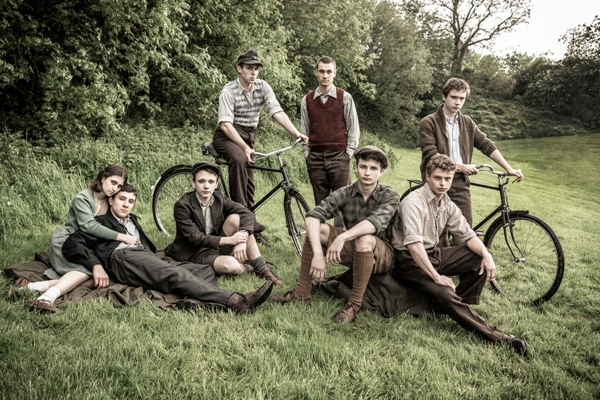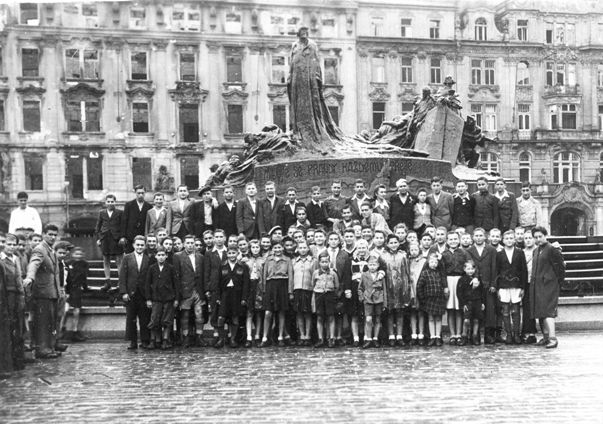The historical drama The Windermere Children and the accompanying documentary The Windermere Children: In Their Own Words tell a powerful true story. Both should be on your weekend viewing list.

This year’s pandemic and its wide-reaching effects will be remembered for generations. In the decades-old memories of those who survived are World War II and the Holocaust, of which 2020 marks the 75th anniversary of the end of both.
This is also the year that two programs, The Windermere Children and The Windermere Children: In Their Own Words, have come to television to tell the little-known true story of a group of orphaned Jewish children — survivors of Nazi concentration camps whose lives were forever changed when they were given refuge in Britain in 1945.
Of the nearly 800 children who were helped by the British government that summer, 300 were brought from Prague to the Calgarth Estate by Lake Windermere in England. It was here that the orphans — arriving by bus without any family, possessions, knowledge of England or the English language, or idea of what the future would hold — began their new lives.

Philanthropist Leonard Montefiore of the Central British Fund organized this pioneering project, and teacher and social worker Oscar Friedmann, himself a concentration camp survivor, managed the project at Windermere, where a team of counselors and other volunteers used their skills and compassion to help rehabilitate the children.
“Good things started at Windermere.”
Narrated by Iain Glen, who plays one of the carers in The Windermere Children, the documentary The Windermere Children: In Their Own Words features interviews with several of the former child survivors, archival footage and photos, and clips from the dramatization of their story.
These men and women share their experiences — of life before the war, of the horrors of the Holocaust and the concentration camps, and of the positive impact of being at Windermere, including the lifelong friendships they made there.
“It was like a family.”
Additionally, historian Trevor Avery, of the Lake District Holocaust Project, frames the personal stories within the historical context — from the Nazis’ treatment of Jews during the war, to Britain’s own state of crisis after six years of war, to Montefiore’s determination to help the orphaned survivors.
We get to see Montefiore’s project in action in the historical drama The Windermere Children.
The Calgarth Estate is the site of a former seaplane factory, and it is here that Leonard Montefiore (Tim McInnerny, White Dragon) and Oscar Friedmann (Thomas Kretschmann, Valkyrie) welcome the last busload of orphans to England.
With the hell they endured being still fresh in their minds, the children quickly interpret things like boys on one side, girls on the other as a set-up to their becoming victims of a new group of tormentors. But they soon realize that this camp is not another Auschwitz — they don’t have to hide bread to stave off starvation, and no one is going to pursue them if they run off.
Over the next four months, they play football with Scottish sports coach Jock Lawrence (Iain Glen, Game of Thrones), express their pain and trauma through painting and drawing with art therapist Marie Paneth (Romola Garai, The Miniaturist), learn English with Rabbi Weiss (Konstantin Frank, Vienna Crime Squad), and ride bicycles to the lake with each other.
And in the process, their carers learn much as well.
But despite having their own rooms and beds, the boys and girls are still haunted by night terrors. Even though Britain has given them refuge, they discover painfully the ignorance of some of the Windermere locals. And when long-awaited letters arrive, they feel deeply the distress the news brings.
Yet, for one amongst them, hope springs eternal.
And for all of them, their experiences at Windermere provide the beginnings of healing — as well as new friendships and a new sense of family.
Understated yet powerful, The Windermere Children and The Windermere Children: In Their Own Words are both heartbreaking and life-affirming. To hear the men and women tell their stories is to know a mere fraction of their histories, to acknowledge them as Holocaust concentration camp survivors, and to celebrate them as the proud Britons they are. To watch their stories unfold on screen is to bear witness to how the Windermere Project played a part in helping them to heal, to grow, and later to thrive.
The hour-long The Windermere Children: In Their Own Words premieres in the US today, Friday, April 3, at 10 PM ET, on PBS Passport. It begins streaming tomorrow on the PBS Masterpiece Prime Video Channel.
The feature-length The Windermere Children premieres in the US on Sunday, April 5, at 10 PM ET, on PBS (check your local listings) and the PBS Masterpiece Prime Video Channel.
__________________
Add your comments on our Facebook and Twitter pages.
Share this post/page.
Outbound links on this page include non-affiliate links and affiliate links; the latter allows us to earn income for qualifying purchases and actions made through the links.
